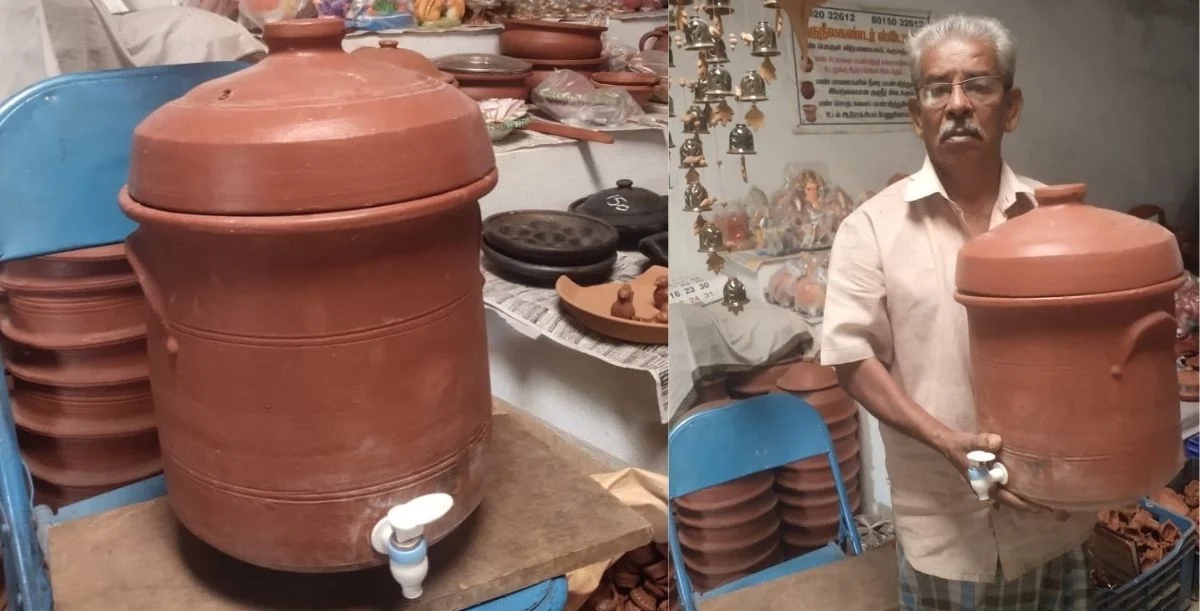n a world increasingly reliant on electricity, one potter from a rural village has crafted a solution that harks back to traditional techniques while addressing modern challenges. Meet Rajesh Kumar, a skilled artisan who has developed a portable clay fridge designed to keep vegetables and dairy products fresh without the need for electricity.
Inspired by the age-old technique of using clay pots for storage, Kumar saw an opportunity to innovate and address a pressing issue in his community: the lack of reliable refrigeration in remote areas. With frequent power outages and limited access to electricity, many villagers struggled to preserve perishable foods, leading to food waste and economic losses.
Kumar’s invention, dubbed the “ClayCooler,” combines traditional craftsmanship with modern ingenuity. The fridge consists of two clay pots—one nested inside the other—with a layer of sand and water in between. This simple yet effective design utilizes the natural cooling properties of clay and evaporation to keep the interior temperature significantly lower than the ambient air temperature.
The process is straightforward: water from the outer pot evaporates through the porous clay, drawing heat from the inner pot and creating a cooling effect. By replenishing the water regularly, users can maintain a consistently cool environment ideal for storing vegetables, fruits, and dairy products.
What sets Kumar’s invention apart is its portability. Unlike conventional refrigerators, which require a constant power source and can be bulky and expensive, the ClayCooler is lightweight, affordable, and easy to transport. Its compact size makes it suitable for small households, rural communities, and even outdoor activities such as picnics and camping trips.
Moreover, the ClayCooler is environmentally friendly, relying on natural materials and processes rather than harmful refrigerants or electricity. By harnessing the power of evaporation, it operates silently and with minimal maintenance, making it a sustainable alternative for off-grid living and reducing carbon emissions associated with traditional refrigeration methods.
Kumar’s innovation has garnered attention not only for its practicality but also for its social impact. By empowering local artisans and promoting traditional craftsmanship, the ClayCooler contributes to the preservation of cultural heritage while addressing contemporary challenges. Its affordability and accessibility make it a valuable asset for communities with limited resources, providing a means to improve food security and livelihoods.
As word of Kumar’s invention spreads, interest in sustainable cooling solutions continues to grow. NGOs, government agencies, and grassroots organizations are exploring ways to replicate and scale up the ClayCooler model to benefit underserved communities worldwide. With its potential to reduce food waste, alleviate poverty, and mitigate the effects of climate change, the ClayCooler represents a shining example of how innovation rooted in tradition can drive positive change in the modern world.
In essence, Rajesh Kumar’s portable clay fridge symbolizes a harmonious blend of past and present, demonstrating that sometimes the most effective solutions are found in the wisdom of the past. As we navigate an increasingly uncertain future, it is innovations like the ClayCooler that offer hope and inspiration, reminding us that sustainable living is not just a possibility but a tangible reality within our grasp.












